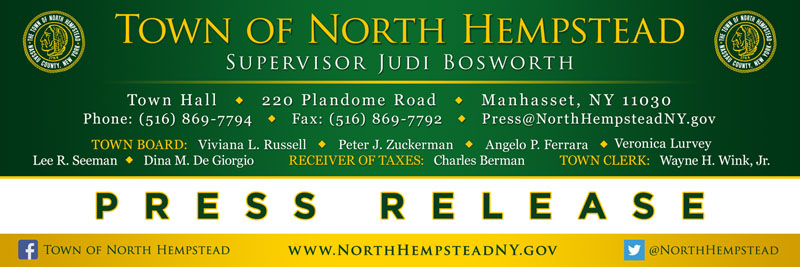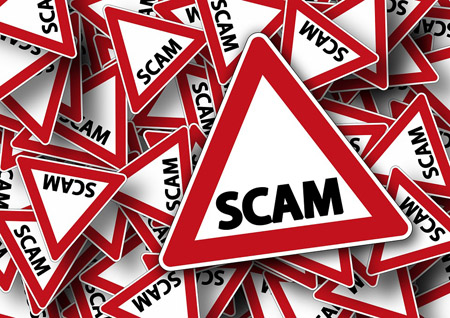
FOR IMMEDIATE RELEASE: March 21, 2019
MEDIA CONTACTS: Carole Trottere, Rebecca Cheng, Vicki DiStefano and Matt Leonenko | (516) 869-7794
Supervisor Bosworth Reminds Residents to Remain Cautious of Scams Targeting Seniors
Recent incidents of Social Security scams highlight need for seniors to be cautious
North Hempstead, NY – Supervisor Judi Bosworth, the North Hempstead Town Board, and Project Independence remind residents to be aware of unscrupulous scammers who target senior citizens, such as recent phone scam claiming that a person’s social security is about to suspended in order to gain access to a person’s Social Security number.
“Scammers now have the ability to manipulate caller I.D. making it seem that you are receiving a call from a legitimate source, but seniors need to be extra vigilant and to look for red flags,” said Supervisor Bosworth. “Social Security would never tell you to wire money, send cash, or put money on gift cards.”
It is important to remember these important points that the Federal Trade Commission highlights:
• Your Social Security number is not about to be suspended. You don’t have to verify your number to anyone who calls out of the blue. And your bank accounts are not about to be seized.
• SSA will never call to threaten your benefits or tell you to wire money, send cash, or put money on gift cards. Anyone who tells you to do those things is a scammer. Every time.
• The real SSA number is 1-800-772-1213, but scammers are putting that number in the caller ID. If you’re worried about what the caller says, hang up and call 1-800-772-1213 to speak to the real SSA. Even if the wait time is long, confirm with the real SSA before responding to one of these calls.
• Never give any part of your Social Security number to anyone who contacts you. Or your bank account or credit card number.
There are many other common scams that are perpetrated on seniors. They include:
• PHONE CALL ASKING FOR BAIL: The request comes from a caller requesting a large sum of money in order to bail a grandchild or loved one out of jail. Verify information provided by callers -- if a call says a loved one is in jail and needs help, call that loved one to verify the information.
• EMAIL ASKING FOR BAIL: The request comes from a friend or loved one’s email address to wire money. Residents of Nassau County receive emails from the account of a friend or loved one claiming to be in another country and requesting a large sum of money for a plane ticket, bail money, or other emergency expenses. In reality, a scammer has obtained control of the sender’s email account and contact list/address book, and the victim sends the money directly to the scammer.
• SWEEPSTAKES SCAM: The victim receives a letter stating that they’ve won a contest, often from a scammer using a variation of a legitimate organization’s name. Enclosed is a check, usually less than $5,000, drawn on an out-of-state bank account. The victim is instructed to call a phone number where they are instructed to deposit the check, saying the money is to pay the taxes on their prize, and wire the money back to the organization. The victim sends the money to the scammer, and then the bank dishonors the original check. The phone number scammers typically use in this scam has an Ontario, Canada area code.
• SECRET SHOPPER SCAM: Victims responding to an ad for secret shopper employment receive a check in the mail for approximately $3,985 and are instructed to deposit the check into their bank account. The victims are told to conduct a survey of retail stores, for which they will “earn” $600 for their work. The last requirement is to send the balance of the initial check, approximately $3,000, to Canada or out-of-state via Money Gram or Western Union. The money is sent before the victim can be informed by their bank that the initial check was counterfeit. The thief is counting on the victim’s bank to make the money available before the check is discovered to be fraudulent.
• PHISHING SCAM: An email or phone call is received by the victim who is led to believe it came from their bank. The call or email asks for the victim to verify personal information such as Social Security number and account numbers. A legitimate bank will NEVER ask for this information.
RED FLAGS
• Anyone you’ve never met or spoken to on the phone that is asking for money through the Internet or to be wired to them is scamming you.
• Always thoroughly research anyone you meet on a social-networking or Internet dating website.
• Be very suspicious if you are asked to send anything through a third party.
• Be very suspicious if an email has misspellings, broken English, or any grammatical anomalies.
• IRS officials will never call or email demanding immediate payment or threaten to call law-enforcement for an outstanding tax bill.
• Utility companies will not offer to come to your home to pick up cash for what they say are outstanding bills.
• Ask callers demanding money for bail or utility payments for their supervisor’s contact information so you can determine if the call is legitimate.
• Emails demanding personal information such as Social Security numbers, bank routing numbers and credit card information should be considered suspicious, especially if they are not addressed directly to the recipient.
For more information about common scams that target senior citizens, visit:
https://ag.ny.gov/smart-seniors
http://ny-nassaucountyda.civicplus.com/188/Safety-Tips-Red-Flags
